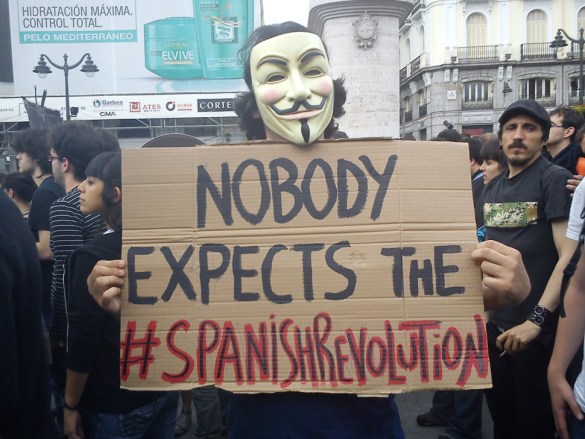Spanish Government makes official the Looting of Pension Funds
September 29, 2012
By LUIS MIRANDA | THE REAL AGENDA | SEPTEMBER 29, 2012

It did not take too long for the Spanish government to dip into the rapidly disappearing pension fund reserves. After presenting its 2013 budget, the Finance Minister Cristobal Montoro announced that the government led by Mariano Rajoy will make use of Social Security, retirement and other supplemental funds to help with the liquidity problems the central government faces as it becomes more expensive for Spain to meet its obligations.
The Executive now counts the 3,063 million from the Social Security Reserve Fund as part of its budget, which it now has stolen from Spanish people who saved and paid into the system for decades. The Social Security Fund has become the piggy bank to obtain quick cash after the Social Security administration itself had tapped into the reserve at the beginning of September, because it did not have enough money to make the payments to its contributors. Ironically, the government has also announced an increase of 1% in pension payments for 2013, which makes one wonder where will the money come from if the system cannot even afford to send the checks out now.
The Government approved the reform plan imposed by the European Union which is a commitments from the Memorandum that opens the door to ask for financial assistance in the form of credit to bailout Spanish banks with a maximum of 100,000 million euro, but that consultants estimate will be of around 53,000 million euros.
The State Budget for 2013 is included in the so-called Spanish Strategy for Economic Policy and a plan that includes up to 43 laws specified in the Official State Gazette (BOE).
The macroeconomic conditions used to create this new budget have not changed from the last time which was filed with the same spending ceiling. Thus, the official forecast remains that GDP will contract by 0.5% in 2013. This is a very optimistic figure when compared to other analysis services such as the one issues by Citi, who expects a decline of 3.3%.
State spending will grow in 5.6% in 2013, mainly due to interest on the debt in the next year, which will amount to some 10,000 million euros. The total amount to be paid in interests for loans requested by the Spanish government will reach nearly 38,000 million euros.
The Deputy Prime Minister, Soraya Saenz de Santamaria, said that this budget contains more spending adjustments than changes in income. In it, 58% corresponds to expenditures, while 42% refers to income. She said that the government remains committed to social spending, which will represent 63.6% of total expenditure. The only items that increase are: pensions, grants and debt interests that make up the increase in government spending.
According to the budget, tax revenue projections for this year will be met fully. For 2013, it is expected that non-financial income will increase to 4% over budget, and 2.6% on budget execution.
The government expects to collect 4.375 million euros with the implementation of new tax measures, increasing taxes and fees included in the 2013 budget. The greatest impact on revenue will come from corporate taxes, the document says, by eliminating the deduction for depreciation for large companies, which will provide 2.371 million euros.
It creates a new 20% tax on lottery prizes, which will affect 40% of the prizes that exceed 2,500 euros. In total, the tax will add 824 million euros to the state coffers. Taxes on net worth will collect 700 million euros. These 1524 million euros will join together with 90 million euros that the government will obtain from eliminating the tax deduction on the purchase of primary residences, which was announced last July.
With these figures, the government has assured Europe that it will comply with its goal to keep the deficit below 4.5% of GDP for 2013.
The Real Agenda encourages the sharing of its original content ONLY through the use of the tools provided at the bottom of every article. Please DON’T copy articles from The Real Agenda and redistribute by email or post to the web, unless you request and receive written permission to do so. If permission is granted, you must publish the article EXACTLY as it appears on The Real Agenda.
